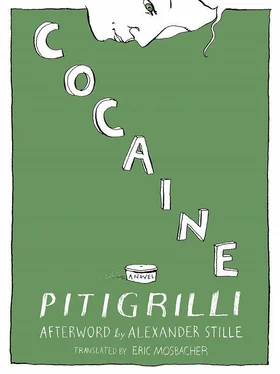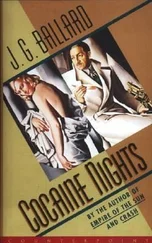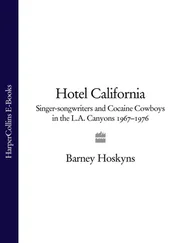Although he was branded by some as a “pornographer,” he would not be considered such by contemporary standards: rather than graphic descriptions of sex, Pitigrilli offered a deeply cynical, iconoclastic satire of contemporary European society.
Behind the official façade of bourgeois morality, traditional family life, and patriotism, Pitigrilli saw a world driven by sex, power and greed, in which adultery, illegitimate children and hypocrisy were the order of the day and husbands and wives were little more than respectable-seeming pimps and prostitutes. Pitigrilli’s sarcastic, aphoristic style shocked and amused by turning conventional morality (and most of the Ten Commandments) on its head:
Never tell the truth. A lie is a weapon. I speak of useful, necessary lies. A useless lie is as unpleasant and odious as a useless homicide…
Do not covet thy neighbor’s wife, but if you do covet her, take her away freely. When in the theater, on the tram or in a woman’s bed, if there is a free place, take it before someone else does…
Hate your neighbor as you love yourself: and don’t forget that revenge is a great safety valve for our pain… Believe me: a good digestion is worth much more than all the ideas of humanity…
Honesty, duty, brotherhood and altruism are like supernatural phenomena: everyone describes them but nobody has seen them; when you get closer, either they don’t happen or there’s a trick behind it… (The Chastity Belt)
Pitigrilli’s cynical amorality captured something of the spirit of Italy in the early 1920s, a society that emerged from World War I with many of its traditional beliefs in pieces. The calls to glory and sacrifice and national renewal had proven cruel illusions, with the death and mutilation of millions resulting in but a few minor territorial changes. Meanwhile, traditional pillars of society — such as the Catholic Church and the country’s economic and political elite — had lost much of their authority. Women were pushing for greater freedom and autonomy, challenging existing standards of personal morality and family structure.
In this tumultuous context, Pitigrilli’s books were quickly translated into numerous languages and he became an international succès de scandale . He then became the editor of a well-known magazine Le Grandi Firme , (The Big Names) the appeal of which was partly due to its daring content and cynical, worldly tone.
In Paris and Turin, Pitigrilli cavorted with society’s upper crust, which experimented with theosophy, occult séances, gambling and narcotics as means of replacing the old certainties supplied by church and fatherland. In Cocaine , perhaps his most successful effort at a sustained narrative, Pitigrilli describes a world of cocaine dens, gambling parlors, orgies and lewd entertainment. His main character Tito Arnaudi goes to Paris and finds himself swept up in the post-war French metropolis:
Montmartre is the modern Babylon, the electrified Antioch, the little Baghdad, the Paradise of the cosmopolitan noctambulist, the blinding, deafening, stupefying spot to which the dreams of the blasés of the whole world are directed, where even those no longer able to blow their noses come to challenge the world’s most expert suppliers of love. Montmartre is the Sphinx, the Circe, the venal Medusa of the many poisons and innumerable philters that attracts the traveler with a boundless fascination.
The principal occupation of the characters of Cocaine is using narcotics, sex and alcohol to distract themselves from the horrors of real life. As Tito puts it at one point: “Life is a mere waiting room in which we spend time before entering into the void.” In searching for any kind of thrill or stimulation, they resort to “the fashionable poisons of the moment, the wild exaltation they produce, the craze for ether and chloroform and the white Bolivian powder that produces hallucinations.”
Tito, a failed medical student who has just been hired as a journalist, begins to investigate cocaine dens in order to write an article for a Paris newspaper appropriately named The Fleeting Moment . In the course of his research, he indulges in the white powder, which for a time acts as a kind of welcome balm, giving him “a sense, not just of euphoria, but of boundless optimism, and a special kind of receptivity to insults, which were converted in his ears into courteous compliments.”
As Tito’s lover, (or one of his lovers), Kalantan, tells him:
“There’s still hope for you… You haven’t yet got to the stage of tremendous depression, of insuperable melancholy. Now you smile when you have the powder in your blood. You’re at the early stage in which you go back to childhood.”
She spoke to him as to a child, though they were both of the same age. Cocaine achieves the cruel miracle of distorting time.
Kalantan is a wealthy Armenian woman whom Tito meets on the cusp of widowhood. A drug addict as well, she keeps a black coffin in her bedroom for making love. She explains her curious habit thus:
It’s comfortable and delightful. When I die they’ll shut me up in it forever, and all the happiest memories of my life will be in it… It also offers another advantage. When it’s over I’m left alone, all alone; it’s the man who has to go away. Afterwards I find the man disgusting. Forgive me for saying so, but afterwards men are always disgusting. Either they follow the satisfied male’s impulse and get up as quickly as they do from a dentist’s chair, or they stay close to me out of politeness or delicacy of feeling; and that revolts me, because there’s something in them that is no longer male.
Sex, like cocaine, provides only a brief distraction from life’s horrors, followed by disgust.
In the world of Cocaine and its main characters, life is a decorative mask with despair always just under the surface:
“Tell me why my heart goes on beating and for what purpose,” Tito asks Kalantan. “If you knew how many times I’ve been tempted to send it a little leaden messenger telling it to stop at once, because one day it will stop naturally, of its own accord, and why should it take the trouble of going on until then?”
The outside world of work and industry is nothing more than another sham and a cheat. Another of Tito’s journalistic assignments, in addition to his cocaine reporting, is to cover the execution of a serial killer. Tito, exhausted after a night of debauchery, decides to write a purely fictional account of the event, including an “exclusive” final interview with the killer and a gripping account of his death. When it turns out that his life was spared in a last-minute stay of execution Tito’s editor phones him in a rage over the embarrassment of publishing a false account. But the phony account is so wildly successful that the journalists for all the other papers are berated for having been scooped on such a dramatic story.
Like sex, like drugs, Tito’s journalism is just another fantasy or hallucination meant to distract people from the horror of the world as it is.
At a certain point, Tito’s two principal drugs, cocaine and sex, fuse in the figure of Maud, the main female character; Pitigrilli begins to call her Cocaine, since he becomes equally addicted to both at the same time. Maud too is a kind of addict, distracting herself by having sex with a procession of men, in some cases for money and in others for pleasure. She makes no effort to hide her activities from Tito, who follows her to South America in hopes of having her entirely to himself. The affair with Maud follows the course that addiction to cocaine generally follows: leading from initial euphoria to increasing desperation and psychological collapse.
When Tito finally does himself in, Maud and Tito’s best friend, Pietro, attend to him on his deathbed. Struck by Tito’s final despair, they vow to give up their lives of excess but all their intentions of turning over a new leaf fall away in just a few days when Maud and Pietro fall into bed with one another, ending the novel on a note of Pitigrillian cynicism, in which despair is leavened by bitter laughter. For all their apparent darkness, Pitigrilli’s books have a light tone and a quick and breezy air.
Читать дальше



